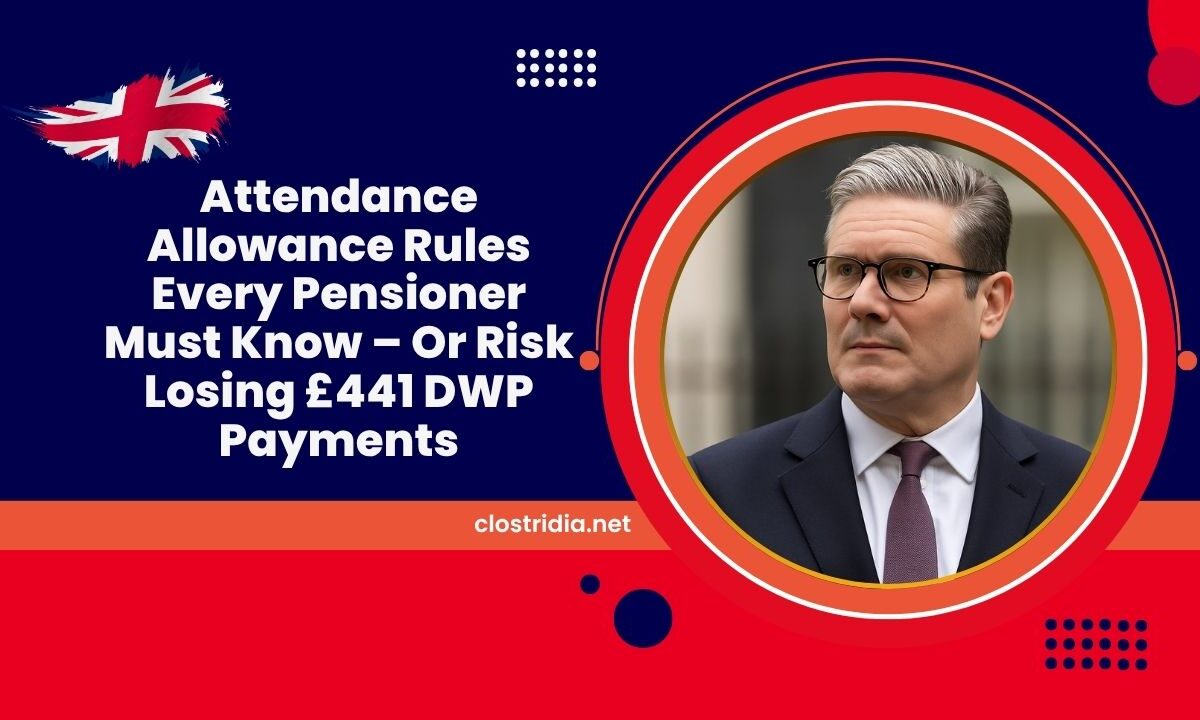The Department for Work and Pensions (DWP) supports nearly 1.7 million older people across Great Britain through Attendance Allowance, a tax-free, non-means-tested benefit aimed at helping people with disabilities, illnesses, or age-related conditions remain independent at home.
However, many recipients may unknowingly risk losing this vital support — worth up to £441.60 every four weeks — by failing to follow key DWP rules.
If you’re aged 66 or over and receive Attendance Allowance, it’s crucial to stay informed and report any changes in your circumstances. Failing to do so could result in overpayments, penalties, or loss of entitlement.
What Is Attendance Allowance?
Attendance Allowance is financial help for people over State Pension age who need assistance with daily tasks or supervision due to illness or disability. It’s paid at two different rates depending on the level of help required.
| Rate Type | Weekly Amount (from April 2025) | Monthly Equivalent (4-week period) |
|---|---|---|
| Lower Rate | £73.90 | £295.60 |
| Higher Rate | £110.40 | £441.60 |
This benefit is not means-tested, tax-free, and won’t affect your State Pension. You can use the money in any way that helps you stay independent — such as hiring help, paying for transport, or covering household expenses.
Who Can Get Attendance Allowance?
To qualify, you must:
- Be State Pension age or older
- Have needed help or supervision for at least 6 months
- Have a disability or health condition affecting daily living or nighttime care
- Be living in England, Wales, or Scotland
- Not already receiving Personal Independence Payment (PIP) or Disability Living Allowance (DLA)
Even those with savings, income, or a pension can apply, as these do not affect eligibility.
Over 50 Conditions Supported
Attendance Allowance supports a wide range of physical and mental health conditions, including:
- Arthritis, back pain, spondylosis
- Blindness, deafness, sensory impairments
- Heart disease, asthma, diabetes
- Dementia, Parkinson’s, Alzheimer’s
- Mental health conditions
- Cancer, neurological diseases, chronic pain
- Terminal illnesses
If your condition affects your ability to live independently, even if you’re not receiving help yet, you may qualify.
Key Rules You Must Follow to Keep Your £441 Payments
To avoid losing your Attendance Allowance, you must report certain changes to the DWP’s Attendance Allowance helpline (0800 731 0122). Failure to do so can result in legal action or loss of benefits.
Report These Changes Immediately
- The level of help you need increases or decreases
- You go into hospital or a care home
- You are told you may have 12 months or less to live
- You plan to leave the UK for more than 4 weeks
- You go to prison
- You change your name, address, or bank details
- You want to stop receiving the benefit
- Your doctor’s details change
- Your immigration status changes (if not a British citizen)
Even if you’re not sure whether a change affects your claim, it’s better to contact the DWP and confirm.
Requesting More Support If Your Needs Increase
You may be entitled to more money if:
- You need day and night care
- Your condition worsens
- You require more physical help with personal tasks
- You need mental health support or supervision
This includes people with learning difficulties, dementia, visual or hearing impairments, or mental health conditions. If tasks take longer, cause pain, or require assistance, report the change and request a reassessment.
How Attendance Allowance Affects Other Benefits
Receiving Attendance Allowance may increase other benefits like:
- Pension Credit
- Housing Benefit
- Council Tax Reduction
It is also exempt from the Benefit Cap, meaning it won’t reduce your other support.
Attendance Allowance offers essential financial help — up to £441.60 every four weeks — for pensioners living with illness or disability.
But this help isn’t guaranteed forever. If your circumstances change and you don’t report it, you could lose your payments or face penalties.
To stay protected:
- Know the rules and reporting obligations
- Contact DWP if you’re unsure
- Regularly assess your need for more support
Staying informed and proactive ensures you get the maximum support you deserve.
FAQs
Will Attendance Allowance stop if I go into hospital?
It may stop if you’re in hospital for more than 28 days. You must report the dates and details to DWP.
Can I still receive Attendance Allowance if I have savings or income?
Yes. Attendance Allowance is not means-tested, so savings and income do not affect eligibility.
How do I report a change in my condition or circumstances?
Call the Attendance Allowance helpline on 0800 731 0122 (Mon–Fri, 8am–6pm) to update your information.

